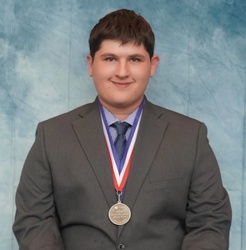U.S. Stockholm Junior Water Prize Names Bernstein Winner

Justin Bernstein of Connecticut has been named the national winner of the 2024 U.S. Stockholm Junior Water Prize (SJWP). Bernstein’s project expanded on previous research by using genetically engineered cryobacterium to protect glaciers. The bacterium, exposed to a naturally occurring silicic acid on the glacier, converts into glass. This glass enhances the glacier's ability to reflect solar radiation, preventing ice cap melting and subsequent sea level rise.
Bernstein receives a $10,000 prize and will travel to Stockholm in August to represent the United States at the international competition. After being named the overall winner by the competition’s 18 judges, Bernstein explained why he chose this research topic. “I live in a coastal town and have already seen the effects of flooding,” he said. “It’s really concerning that in the future, many coastal towns and cities could be underwater. I wanted to help prevent that from happening.”
The Water Environment Federation (WEF) and Xylem Inc. sponsored the 27th annual event, held this year at the Colorado School of Mines. The competition is open to projects focused on improving water quality, resource management, protection, and drinking water and wastewater treatment. 39 states plus Puerto Rico were represented by 47 students, with their travel sponsored by their respective WEF member associations. Over 150 volunteer judges chose winners at the state level.
Head judge Austin Alexander, Vice President of Sustainability and Social Impact at Xylem, was impressed by Bernstein’s research. “One of the great challenges we're experiencing with climate change is the melting of ice caps,” she said. “Justin's project was absolutely fascinating in the way he applied previous research combined with his new, innovative solutions. We're really impressed with the depth and breadth of his research.”
Other students receiving awards at the SJWP ceremony included two runners-up. Krishnam Goel of Utah conducted research on redefining the paradigm of toxic algal blooms under nutrient-limited conditions. The team from Pennsylvania – Aditya Kothari and Remington Yang – was also named as a runner-up for their prototype using non-thermal plasma coupled with granular activated carbon for the degradation of short-chain PFAS.
Dylan Striek of Massachusetts was awarded the Bjorn von Euler Innovation in Water Scholarship for his project, “The Electrolytic Extraction of Dawsonite from Ocean Water: Efficient Salt Water Mineral Recovery Through Electrolysis.” Mahi Patil of Florida received the James L. Condon Recognition for Environmental Stewardship for her project, “Year 2: A Novel Biodegradable Sorbent for Oil Spills.”
In the U.S., WEF and its member associations organize and present the regional, state, and national competitions with support from Xylem, which also sponsors the international competition.
Janet Hurley Cann, P.E., a member of WEF’s Board of Trustees, discussed the intense competition she observed this year. “A team of 18 highly qualified judges deliberated for two days because these students' projects demanded that level of attention and consideration,” she said. “The passion and excellence from these students definitely give me hope for the future.”
Visit www.wef.org/sjwp for more information on the U.S. Stockholm Junior Water Prize.
About WEF
The Water Environment Federation (WEF) is a not-for-profit technical and educational organization of more than 30,000 individual members and 75 affiliated Member Associations representing water quality professionals around the world. Established in 1928, WEF’s mission is to inspire the water community in pursuit of human and environmental well-being. WEF’s goals are to attract and develop a passionate workforce, cultivate a purpose-driven community to sustainably solve water challenges for all, and lead the transformation to the circular water economy.
Source: Water Environment Federation (WEF)
